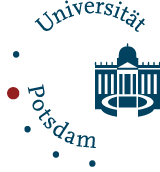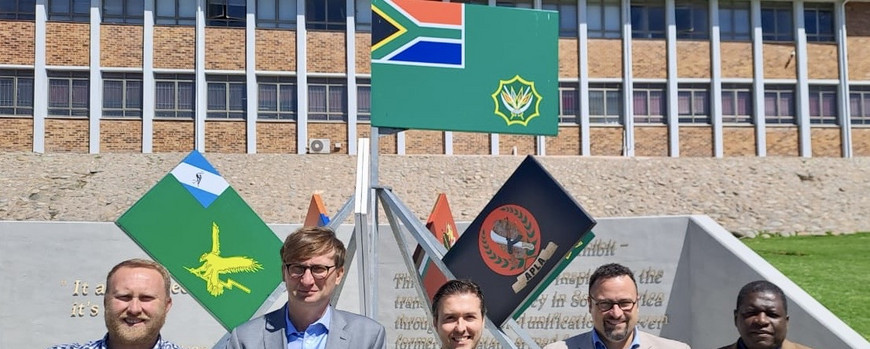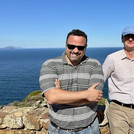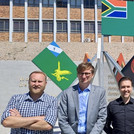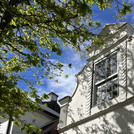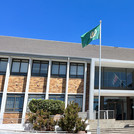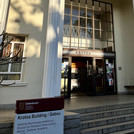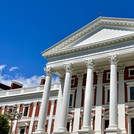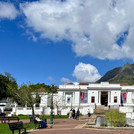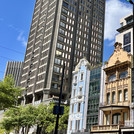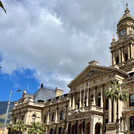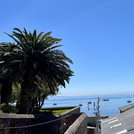22.-30.09.2023: War Studies Delegation deepens cooperation with partners in South Africa
A delegation from the Chair of War Studies journeyed to the South African province of the Western Cape from September 22 to September 29. What prompted the trip was the opportunity to hold a full-day workshop on military cultures of violence at the Department of History of the University of Stellenbosch as well as an invitation to visit the Military Academy in Saldanha Bay. The delegation used this opportunity to give a series of papers in Stellenbosch, Saldanha and Cape Town, and at the margins of these events engage in several talks on how to deepen the cooperation between the military history partners.
On September 26 the Potsdam delegation visited the Military Academy of the Armed Forces of South Africa in Saldanha, some two hours north of Cape Town on the country’s west coast. The delegation was treated to a guided tour through the institution, a visit to the unification memorial of the armed forces and a reception, which were reciprocated by two guest lectures: In front of students and staff of the academy Sönke Neitzel talked on the „Zeitenwende“, i.e. the impact the war in Ukraine is having on German security policy, while Christian E. Rieck reflected on Germany’s contributions to the African Peace and Security Architecture. The subsequent meal in the Blue Bay Lodge provided spectacular views of the bay and an engaged discussion about regional security policy.
The workshop on military cultures of violence for graduate students and staff took place at the Department of History of the University of Stellenbosch on September 27, providing a glimpse into the work of the research group of the German Research Association (DFG) at the Chair of War Studies. The originally Cape Dutch university town has a century-old history of university studies and lies east of Cape Town, at the foot of the Simonsberg and surrounded by the largest wine region of the country. Here, Sönke Neitzel introduced the theoretical framework of the research group as well as his thoughts on the “German Way of War” in the Great War that rejected the hypothesis of a specifically German (uninhibited) culture of violence so widely shared throughout the English-speaking world. Alex J. Kay presented a comparison between the British and the Canadian military culture of violence during the era of the World Wars and identified differences between the two, especially during the Second World War, something that pointed to differing experiences in the interwar period.
The country office South Africa of the Konrad Adenauer Foundation (KAS) organized an alumni event in Cape Town on the evening of September 29 which the delegation used to network. In front of an interested audience which included former ambassadors, journalists, presidential councilors as well as scholarship holders of the Public Policy Program of the foundation, Christian E. Rieck debated the agency of African states amidst the growing great power rivalry. The long and lively debate after the talk demonstrated that actors in South Africa know about the opportunities and risks of the new multipolarity. The audience also criticized the foreign policy of the current administration that was seen as not strategic enough.
The trip was a great success: It provided the delegation with many diverse impressions of the politics, history and society of the regional power in Southern Africa. Also, our colleagues in Saldanha and Stellenbosch have engaged the delegation in a passionate academic discussion, showing the strong interest present in South Africa in German and European military history and security policy. The South African military and contemporary historians complement the strengths in Potsdam very well, making the mutual exchanges very fruitful in the eyes of both partners. This should benefit the MA programs in War and Conflict Studies coordinated by the Potsdam Chair as well.
It was agreed to establish a low-threshold exchange of lecturers to first contribute digitally or in person to the teaching at partner institutions. In the medium run research collaborations are also envisaged, for example within the framework of the DFG research group that already has a South African PhD student. The long-term goal remains a student exchange with the Faculty of Military Studies of Stellenbosch University at its facilities in Stellenbosch and Saldanha. The first interns will be sent to KAS Cape Town already in the coming year.
We are deeply grateful to Professors Evert Kleynhans (Saldanha) and Justin Pearce (Stellenbosch) for the invitation and the organization on the ground.
